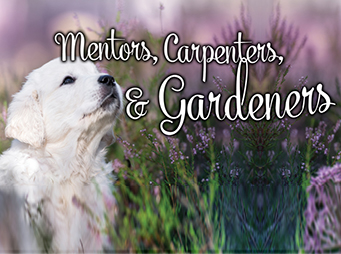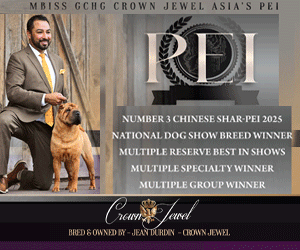Mentors, Carpenters, and Gardeners
Click here to read the complete article
144 – September 2019
By Kat Smith
A breeder I know posed a question on Facebook – the open-ended kind with no right answer, just lots of opinions and suggestions. Many people with many years of experience posted their ideas. That is until this breeder’s mentor commented that the breeder should have asked them, and only them, this question. Instead of celebrating learning, the mentor dismissed all other valuable input and shamed the asker for their intellectual curiosity. People complain that there are no mentors, and people complain that no one wants to be mentored. I think some recent theories on parenting styles might explain why it’s become so difficult: because we have a lot of carpenters and not many gardeners.
The Carpenter will take an unblemished block of wood and turn it into their version of the perfect table. Their vision is clear, and their standards are high. They carefully carve and plane. Often, their tables are beautiful.
But sometimes Carpenters become too fixated. Someone may point out that this block of wood may make a better chair than a table, or suggest a different joint may provide more structural support. The Carpenter will call them ignorant and irresponsible – even if they are accomplished table-builders themselves.
Carpenters occasionally sell blocks of wood to people to create their own tables. However, with the sale comes the stipulation that the buyer may never, under any circumstances, use anything other than the Carpenter’s preferred brand of hammer and chisel. Additionally, they may only produce the style of table that the Carpenter has created. Any additional flourishes, any custom touches, any deviation from the plan, and the Carpenter is furious that they have wasted their time and a good block of wood. The Carpenter may never be able to see that this other table is stunning – just different.
Then there are Gardeners. They tend the soil, plant the seeds, and provide water and sunshine. But then they step back and let the plants grow. They might step in to prevent their seedlings from being too far into the weeds, but they understand that they cannot exert control over every corner of the garden. These people, too, can be masters of their craft; many find great success by embracing the fact that things don’t always go as planned.
Gardeners understand that bees that move from flower to flower and garden to garden, taking and spreading the best that each has to offer. They often acknowledge that while they have the best soil, their neighbor has a superior irrigation system, and knowledge can be shared and adapted. In this way, Gardeners deeply understand that the success of those around them contributes to their success.
I believe that more people would be happily mentored if we had more Gardeners and fewer Carpenters. If mentors carried realistic expectations of working with other human beings, not bots and clones, there would be less disappointment and burn out. If mentees felt they had room for some of their ideas, and some basic respect, there would be less fighting back and walking away.
(For the would-be mentee, I pass along wisdom from Jon Lovett in a 2013 commencement speech: “There are moments where you will have a different point of view because you are a fresh set of eyes. Because you don’t care how it’s been done before – you’re sharp and creative, and there is another way, a better way. But there will also be moments where you have a different point of view because you are wrong because you should shut up and listen to somebody who has been around the block.”)
Breeds thrive when people have slightly different ideas of perfection. Breeders thrive when they can accept bits of wisdom from many mentors, and the crowdsourced wisdom puts them on the shoulders of giants. Let us all spend more time tending our gardens and less time sitting at our tables.
Click here to read the complete article
144 – September 2019
Short URL: http://caninechronicle.com/?p=170036
Comments are closed












